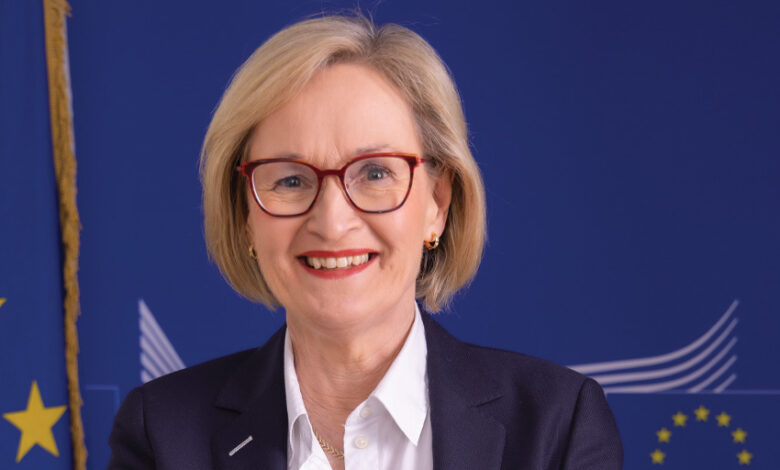Mairead McGuinness: 50 years of Ireland in the EU

The 50th anniversary of Ireland’s accession to the European Union is a great opportunity to reflect on where we stand in Europe and where we are heading, writes European Commissioner for Financial services, financial stability and Capital Markets Union, Mairead McGuinness.
One of the EU’s founding documents is the Schuman Declaration – the vision of former French Foreign Minister Robert Schuman to create unity and solidarity in the wake of the Second World War. Schuman’s words remain relevant today: “Europe will not be made all at once, or according to a single plan. It will be built through concrete achievements which first create a de facto solidarity.”
In 1973, when it joined, Ireland was a relatively poor and underdeveloped country on the periphery of Europe, depending significantly on the UK market. Divorce, contraception, and homosexuality were still illegal, and the marriage bar was still in place. 50 years later, Ireland looks very different. We are a much more prosperous country, at the heart of the EU.
Ireland has made progress not only economically, but also socially, with EU equality law helping end the marriage bar and supporting moves towards equal pay and parental leave. We have gone from being a net beneficiary of the EU budget for many years to now being a net contributor.
But the EU is a project in constant change. Progress is not always inevitable and over the 50 years there have been setbacks. Some will remember the beef mountains – not long after we joined; we had food scares; we had the financial and sovereign debt crisis.
More recently we have dealt with Brexit, Covid and now Russia’s illegal invasion of Ukraine. And with each of these crises, there was a realisation that a common European response and solidarity among member states was the only way to deal with them.
Ireland saw EU solidarity in action as we faced specific impacts of the UK’s decision to leave the EU. I recall that in many debates in the European Parliament on the topic of Brexit, MEPs from Germany, Croatia, Portugal, to mention a few, stood up in the chamber in Strasbourg and Brussels, and they spoke about the issues impacting Ireland and Northern Ireland. It was a real sign of EU integration – of looking out for each other – and we need more of it.
The initial fears that Brexit would be the start of the disintegration of the EU did not materialise. Rather there was a determination to avoid that happening, by working closer and better together.
The difficult political debates and severely strained relationship between the EU27 and the UK had to be overcome to reach a new way forward. The EU collaborated to find that way forward. First, it reached the Withdrawal Agreement, then the Trade and Cooperation Agreement, with the UK. More recently – after many setbacks – we now have the Windsor Framework.
This was all about recognising the unique situation of Northern Ireland and wanting to make sure there were no border on the island of Ireland. And this allows the EU, and the UK could leave behind the worst post-Brexit days.
It is worth recalling that Ireland, the UK, and Denmark joined the then EEC in 1973. As Ireland and Denmark celebrate their 50 years of engagement, the UK continues to find its path outside the EU.
Europe has shown and continues to show solidarity with the people of Ukraine in the wake of Russia’s illegal invasion. This also posed other challenges for the EU as Russia weaponised its gas supplies. This was a wake-up call for the EU to which it responded by diversifying its supply chain and becoming much more efficient in using energy. The EU has continued to ramp up investment in renewable energy to meet its energy needs and address climate change.
The resilience of the EU’s 27 member states is impressive in the face of major shocks and challenges.
Mairead McGuinness, Commissioner for Financial services, financial stability and Capital Markets Union, European Commission
The resilience of the EU’s 27 member states is impressive in the face of major shocks and challenges. The world is becoming much more multipolar. We found during Covid that we were overdependent on medicinal supplies. We discovered our overreliance on fossil fuels from an unreliable supplier. Today, conscious of these vulnerabilities, the EU is focused on open strategic autonomy.
The EU is examining where it may be overly dependent on other countries, including for key components of the renewable energy sector. And it will strengthen its own capacity where necessary.
Tackling climate change is the EU’s biggest challenge and we must act and work with global partners to avoid irreversible damage. The EU is leading the way with the European Green Deal that aims for climate neutrality by 2050. It ties in with my own work on sustainable finance, which seeks to help investors, financial institutions and companies move towards a more sustainable path.
The debate around security and defence is beginning to grow, including at the Irish level. I think we are mature enough, as a society, to have an open dialogue on what we want for Ireland’s security and defence in the context of our membership of the EU. Any discussion on security must include cybersecurity threats.
In 1972, I was too young to vote in the referendum to join the EEC. But I am grateful to those who had the vision and courage to propel our country forward. We have come a long way. At the age of 13, I was not to know that the EU would become central to my life and work, as a member of the European Parliament and now Ireland’s EU Commissioner.





